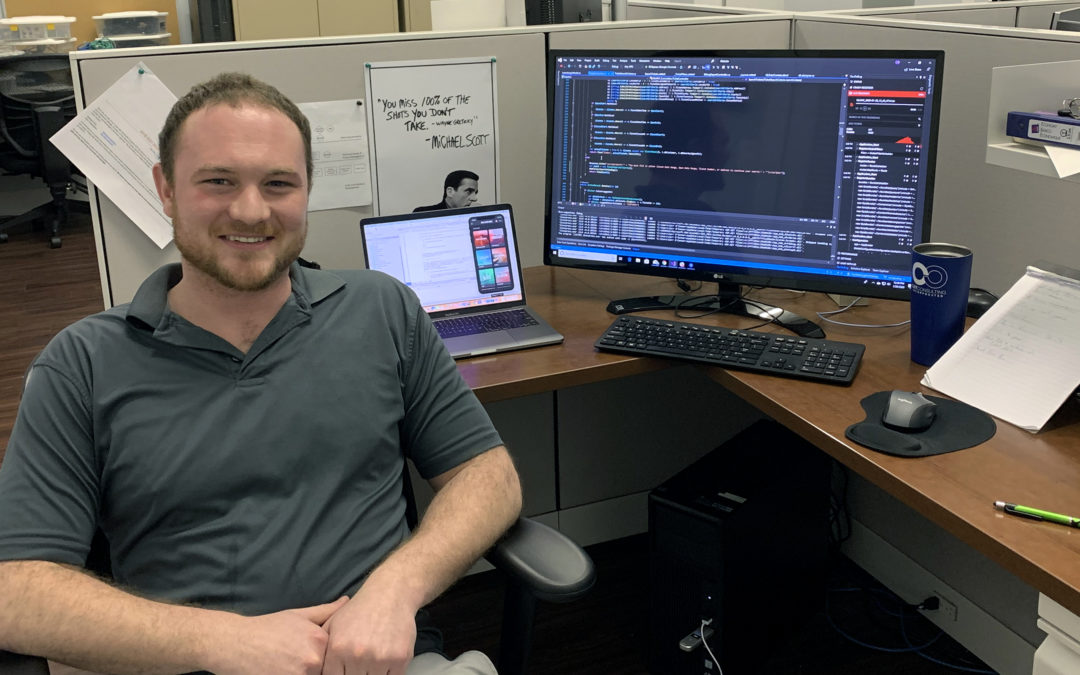I would like to share some of my experiences regarding my first six months of my first full time position as a software developer. According to the Bureau of Labor Statistics, employment for software developers is expected to increase by 28% from 2018 to 2028. Hearing a statistic such as this contributed to my interest in the field and going from a tech-loving teen who built a computer from scratch “for fun” to a 24-year-old millennial, the passion was already there. However, I was working a labor-intensive job for very little pay and for people that demonstrated little interest in my future or professional development.
Similar to like-minded ambitious young people, I began working towards my professional goals. At the time I had some college experience, a little introduction to basic web development and coding. As I educated myself on important steps to take, I enrolled in a coding bootcamp (trade school for software development). During this time, I got a job at a restaurant which involved mostly evening hours in order to keep my daytime hours available to focus on software development. In addition to trade school and my restaurant gig, I acquired an internship and began picking up paid contract work on the side. Throughout the whole process, the passion behind my work allowed me to enjoy the process which solidified the fact that I was in the right field. About six months ago, the hard work paid off and I landed my first full time position as a software developer for C2IT Consulting.
It was all very exciting, but with starting any new venture in life, there were still some questions I had. Am I good enough yet to be getting paid to do this? Am I going to be able to hold my own with the rest of my new team? Am I going to get along with my new co-workers? Should I keep clocking time on a project even when I’m banging my head against the desk and fairly certain I’m not going to be able to solve this question today? I had hundreds of questions and scenarios floating through my head at the time but was also infused with excitement and blinded by courage.
Day one on the job I woke up extra early, put on the new shirt and slacks I bought for the job, and everything went smoothly. Most of my time was spent doing onboarding paperwork, getting my development environment set up for some of the current company projects, and reading through some of the code as I tried to get myself familiarized with their style and what I was about to dive into. I was super excited about the first day and went to the gym that night deciding to do an extra-long workout to get my jitters out.
That came around to bite me because on day two of the job, I was late… about two hours late. Being used to getting off work somewhere between midnight and 3am while working at the restaurant and all the excitement from the day before was definitely an adjustment I had to get used to. The second day was awkward to say the least. Later that day my project manager approached me and said one of our clients had an issue with their web app and we needed to get this resolved by the end of the day. Honestly, I thought this whole scenario was a test and maybe they put this bug in the code on purpose just to see how I would do. It turned out to be a pretty easy NullReferenceException, and I made it through day two.
A couple months went by and I continued to adjust to my role at the company, got to know my coworkers, and felt able to learn at an exponential level. One thing I was always looking forward to and knew would be a great opportunity was to code full time instead of around my other work schedule or on the weekends. Being able to immerse myself in something and not take time off or have to relearn something I did in the past was one of the greatest advantages to this new opportunity. Additionally, I was grateful to have a great mentor coming into this new role. Although I don’t have to lean on him as much now, he was and is always a great resource in this field, especially when it comes to bouncing ideas off him or getting help finding a new approach to a problem.
As more time goes by, I am introduced to more projects, different languages, and different frameworks to accommodate the needs of our clients. These have all been excellent opportunities for me to learn something new while feeling the pressure to deliver something of high quality in an acceptable amount of time. Most of my work at this position has been in Xamarin – code written in C# – but it’s also not uncommon for a project to be in ASP.NET MVC, ASP.NET Standard, Javascript, HTML, CSS, and I’ve run into a lot of Java when building in Xamarin. Besides just learning new languages through these projects, I would say after about the third month I started to try and focus on different areas that are included with any software development job. I started to gain a new appreciation for well documented code and bringing a higher focus into writing cleaner, documented, and easy to read code. That still needs a lot of work on my end, however, I can confidently say something started to click around that time.
Within the first six months of your first coding job, or any job for that matter, you start to learn what are great questions to ask your boss and what are not-so-great questions to ask your boss. In any case, I don’t think you should be nervous or hesitant to ask your boss something. There are things you should do before bringing it to their attention. Make sure you researched your question and you can clearly define what you are trying to do instead of going to them in an anxiety ridden state where your words are too broad and don’t properly define the problem. I would also be prepared to explain some of the different steps you’ve already taken before bringing it to their attention or possibly refer them to a resource you were following as well. In general, especially in an intro development role, you shouldn’t feel negative about bringing questions to your superior. They have invested time and money into you and want you to improve, if that means pointing you in the right direction every once in a while, then that’s okay.
Trying to immerse yourself in the industry will also bring a lot of benefits to your first development job. Find a friend or two in the industry, go to some meetups, stay in touch with your old professors, follow a related Reddit or Feedly thread. I believe all these things help me to just stay in conversation with others about the technology you’re working on or what others are working on. You’re bound to hear something interesting or learn of a cutting-edge technology that’s about to hit mainstream. I believe it’s a positive thing to get excited about what you’re working on even if you’re not in love with all your projects.
On a final note, I would like to leave you, or anyone interested in landing their first software developer job, with the fact that learning doesn’t end when you get the job. I run into situations everyday where I’m not exactly sure how to go about it right away. Stay focused, try different angles, and don’t get frustrated about what you don’t know. There will always be more learning to endeavor and new technology to undertake. Don’t let it scare you. It should excite you. Technical documentation gets easier to read and understand the more you go through, so don’t beat yourself up if you read a paragraph and think “I have no idea what they just said”. It all comes with more time and practice, and I still have a lot more time and practice ahead of me. All in all, the job can be stressful at times but making this career switch has been nothing but beneficial for me. I encourage anyone who has thought about getting into software development to take an intro course and see if it is something that excites you.
Join our team
Error: Contact form not found.




Recent Comments